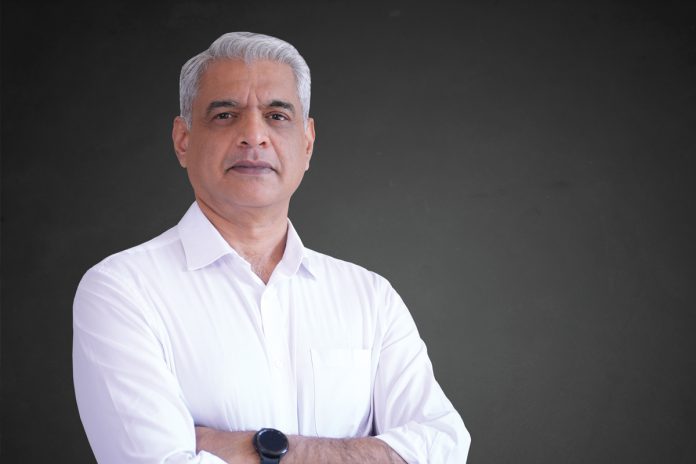Capt. Raghu Raman (Former Army officer, Founding CEO of NATGRID, strategic coach, and bestselling author) reflects on the limits of deterrence, the future of India-Pakistan relations, and why true security lies not in arms, but in interdependence
Words by Charudatt Chindarkar
In the wake of the Pahalgam terror attack and India’s subsequent military response, many have asked what lessons can be drawn from yet another tragic flashpoint in a decades-long conflict. But Capt. Raghu Raman, founding CEO of NATGRID and former officer of the Indian Army, suggests we may be asking the wrong question altogether.
“If you’re only looking for tactical lessons, you’ll get tactical answers—what time to strike, what location to hit,” he says. “But the real issue lies in the pattern. Each cycle of conflict—2016, 2019, now—comes faster, escalates more, and yields shorter-lived deterrence. That tells us we’re not solving the root problem.”

A Shrinking Deterrent Window
Capt. Raman points out that if military strikes alone were enough to neutralize threats, then prior responses—from surgical strikes to Balakot—should have served as long-term deterrents. “But the shelf life of each deterrent action is shortening. This time, we crossed a new line—it wasn’t just retaliatory action in contested areas like PoK; it was mainland-to-mainland exchange,” he asserted.
With each iteration of response and counter-response, both the frequency of attacks and the level of escalation required to maintain parity have grown. “Eventually, the question will be—what now? Where do you go after the next strike?” he asks. “This is a zero-sum game.”
Reframing the Problem
Raman urges a shift from tactical thinking to strategic recalibration. The real challenge, he says, is not how to retaliate effectively—but how to prevent the next escalation from occurring at all. “We can’t wish Pakistan away. Geography doesn’t change,” he states plainly. “And fragmenting it further won’t stabilize the region either. We saw that with East Pakistan. Refugees came to us then, and they will again.”
Instead of containment or retaliation, he advocates for a bold pivot: economic interdependence. “India’s economy is 7 to 10 times larger and growing. If Pakistan can be encouraged to shift its gaze eastward—towards regional integration, prosperity, and shared growth—the dynamic fundamentally changes.”
The Slipstream Strategy
Capt. Raman remains clear-eyed about the opportunity at hand. “India has the economic velocity to pull the entire subcontinent into its slipstream—Pakistan, Bangladesh, Sri Lanka. If Pakistan chooses this route, it joins the story of one of the world’s fastest-growing economies. If it looks west, it faces the examples of Afghanistan and parts of Iran—fractured, tribal, with no national coherence.”
Far from being naive idealism, this argument is backed by sound strategic logic. “A stable Pakistan is in India’s best interest,” he says. “The current belief that a fragmented or destabilized neighbor benefits us is dangerously short-sighted. In reality, it will only multiply the actors we’ll need to negotiate with—and increase internal instability.”
The Three Conversations
Capt. Raman breaks down the complexity of engagement. “India isn’t dealing with a single Pakistani entity. There’s the civilian government, which holds nominal power. Then there’s the military establishment—arguably the real decision-maker. And finally, the people of Pakistan, who themselves are fractured across provinces and ethnic lines.”
For any meaningful shift, India must engage across all three levels, he asserts—and also reflect internally. “Our political class must learn to distinguish between the conversation on stage and the one in the backchannel. And as a nation, we must think beyond the next election.”
The True Cost of Arms
Security spending, Capt. Raman notes, is a necessity—but it comes at a cost. “Every aircraft we buy is five hospitals we don’t build. Every aircraft carrier is five smart cities unfunded. Every rupee spent on weapons is a rupee not spent on nutrition, women’s safety, or education.”
This is not an argument against a strong military, he clarifies, but a call to reduce the need for it. “We need leaders who aim to kill the enmity, not just the enemy. Because enmity has roots—and if those aren’t addressed, deterrence is just a temporary bandage.”
He goes on to say, “We often accuse other nations of producing people with no exposure to science or innovation. But what are we doing to ensure we don’t fall into the same trap? Are we investing in education, R&D, and next-gen technologies? Or are we playing into their playbook, focusing only on reaction?”
The Long Game
True national strength, according to Capt. Raman, lies not in outgunning your adversary, but in outgrowing them. And that begins with a shift in mindset—from short-term political wins to long-term national investments.
“Our real enemy isn’t across the border. It’s malnutrition, poor education, unemployability, pollution, water scarcity,” he says. “These problems don’t respect borders. Pollution doesn’t stop at the LoC. Water tables are shared. Climate change is a common enemy.”
He points to the first real instance of a water war in the subcontinent—a chilling precedent. “We’ve talked about water wars for decades. But we’ve now seen the beginnings of it. And if we don’t address that with foresight, we are heading towards collapse.”
What True Power Looks Like
Raman offers a reframing of what power means. “We often quote Mao—‘Power flows through the barrel of a gun.’ But that’s not true. Power flows through the economy, which allows you to buy the gun.”
That’s why, he says, economic cooperation must replace antagonistic posturing. “More tanks won’t solve what schools, jobs, and joint ventures can. It’s time to stop playing Pakistan’s game. It’s time to define our own.”
A Call for Statesmanship
In closing, Capt. Raman is unequivocal: “If you want to solve for the next 20 years, your investments—and your imagination—must change. You need a big-tent vision, with everyone lifting together. That takes statesmanship, not just strategy.”
He offers a parting thought for the region’s youth: “You can inherit the trauma of the past, or you can choose to co-create the future. The subcontinent doesn’t need more weapons. It needs more wisdom.”


